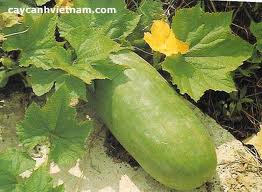
Bí đao (Benincasa hispida), also known as white gourd, ash gourd, wax gourd or winter melon, is grown throughout the country for its fruits. This vine’s flowers, fruits and even the rind contain several healthful properties.
 |
| Benincasa hispida |
Bí đao is very good for human health and can help prevent obesity and beautify the skin
Bí đao (Benincasa hispida), also known as white gourd, ash gourd, wax gourd or winter melon, is grown throughout the country for its fruits. This vine’s flowers, fruits and even the rind contain several healthful properties.
Bí đao can be eaten as regularly as possible because it contains a large amount of water, up to 95%, and supplies just 15 calories per 100 grams of the gourd flesh. The flesh, with its abundant dietary fiber, is good for the intestine.
Every 100 grams of fresh bí ao flesh contains 0.4g of protein, 2.4g of carbohydrates, 0.01mg of vitamin B1, 0.02mg of vitamin B2, 0.3mg of vitamin PP and 16mg of vitamin C, and 19mg of calcium, 0.3mg of iron, 12mg of phosphorus, 230mg of potassium and 3mg of sodium.
Since the gourd is rich in potassium, regular intake of it can help prevent the risk of high blood pressure. It also contains rutin, a polyphenol that can protect the heart and the blood vessel, and inhibit the formation of LDL cholesterol, which is considered as bad cholesterol. Given its very small amount of sodium, the gourd is therefore used as a diuretic.
Endowed with provitamin A (carotene), vitamins B9, C and E, and such minerals as magnesium, phosphorus and potassium, intake of bí đao is recommended, especially for women, to prevent fats from accumulate in the stomach area.
The gourd’s vitamin E is believed to be very good for the skin, moisturizing and whitening the skin. It can also protect the skin from wrinkles and discolored spots.
Young gourds have pectin, a water-soluble carbohydrate that can facilitate the peristalsis of the intestine and thus can accelerate the discharge of stool. Ripe gourds have cellulose, a dietary fiber that can help boost defecation and prevent colon cancer.
To fight obesity, or to lose extra weights, bí ao is an ideal vegetable as it has almost no lipid and supplies very low energy. The gourd also has chemical compounds that can prevent sugar from being metabolized into fats in the body, which may lead to weight gain or obesity.
Bí đao’s seeds are good for the liver and lungs, and can be used to treat phlegm, coughing and hemorrhoids. The rind is good for the spleen and lungs, and is often used as a diuretic. The leaves have long been used to treat diabetes, malaria and dysentery. The stems are good for the blood and can fight rheumatism.
In Vietnamese traditional medicine, bí đao has been considered to be cool, or antipyretic and diuretic, so it is often used to treat phlegm and edema, quench the thirst, detoxify the body and fight obesity. The gourd is good for the lungs, spleen, stomach and urinary bladder.
(Source: SGT)



